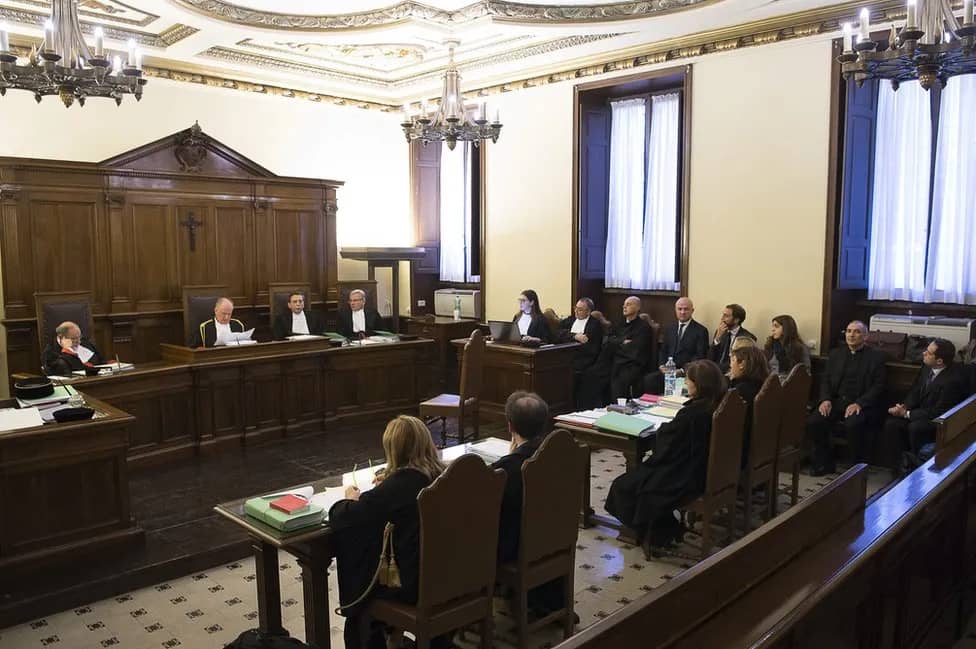ROME – In a new interview book, Pope Francis tries to deliver a “cultural slap” to the modern world by encouraging young people and the elderly, both groups he believes are being discarded by a throw-away society, to enter into a fruitful and positive dialogue.
“The first surprise for the reader is the strong connection the pope makes between youth and the elderly, imagining life as a continuous and fertile dialogue between generations,” said Bishop Nunzio Galantino, head of the Italian bishops’ conference, at the book presentation in Rome March 22.
The book, God is Young, reflects a conversation about youth between Francis and Italian author and journalist Thomas Leoncini. It was published at a time when the Vatican was hosting a meeting of over 300 young people, with the goal of providing guidelines and suggestions for an October summit of bishops on youth and discernment.
“I like to think of the Synod, as the pope says, as being of bishops, but at the service of all youth, both believers and non-believers,” Galantino said. “As a Church, we need to rejuvenate a little bit in our heart, in our sensibility.”
According to Giancarlo Penza, who heads a project of the Community of St. Egidio aimed at helping the elderly, the “revolutionary proposal of this book” is that of instituting a dialogue between grandparents and their grandchildren, which he calls “the slap philosophy.”
Youth today are growing up in an “unrooted society,” Penza said, echoing the words of the pope, where diminishing birth rates – particularly in developed countries – make the encounter between youth and the elderly rarer.
Drawing from the Acts of the Apostles, Francis suggests in the book something that he also told hundreds of young people gathered in Rome ahead of the bishops’ summit – that young people will be “prophets” of the dreams dreamt by old men.
This unexpected synergy between two outcast, and often unheard, groups within society is what, according to Penza, will generate a “cultural slap.”
“These are the pages where we recognize the great work made by Professor Bergoglio,” Galantino said, invoking the given name of Francis. “His many years serving in schools have left him with an educating passion, and a particularly strong ability to dedicate himself to care for younger people,” he said, adding that the pope offers a perspective to understanding youth that goes beyond the latest studies or statistical research.
“There is no such thing as youth, there are young people. There is no such thing as old age, there are the elderly,” the bishop said reading from the volume.
While the first big theme of the book is the old-young relationship that the pope wishes to inspire, Galantino also highlighted four other important aspects that emerged from the conversation between the author and Francis.
“The pope bypasses the generation of parents,” he said, and does not work on the premise that youth must be always defended or protected. The bishop offered the example of many parents who defend their children “no matter what” at school and are blind to their faults.
Galantino also pointed to another “illuminating and ruthless” analysis that the pope offers in the book, regarding adults who don’t accept their aging condition and wish to be eternally young.
“Too often there are adults who want to act like kids, the pope says, and it’s a devil’s game!” the bishop said.
“I cannot understand how an adult can be in competition with a kid,” the pope says in the book.
Also, in the book the pope addresses a failure by adults – including those in the Church – to admit that they didn’t leave youth the “world they deserved,” pointing to consumerism, gossip, failing market systems and a suffering planet as examples.
“The Church also has its responsibilities,” Galantino said, “[because] it wasn’t able to leave a Church that was more engaging,” adding that often it’s perceived as “funerary.”
Finally, the pope also spoke about the importance of political leadership. “Governing is serving each one of us,” the pope says in the book, “without forgetting anyone.” When the author of the book asked Francis what he believes are the worst failures or sins for a leader, the pope said the first is to “destroy one’s self,” and the second is “to not recognize being ridiculous.”
“This 80-year-old man is making us all struggle to keep up with him,” Galantino said. What the book ultimately tries to impart, he added, is that “age is not important to understand the hearts of young people.”
According to the bishop, Francis has adopted a type of language and communication that goes beyond “worn-out politically correct schemes” and goes straight to the heart of people who have fallen into a “sleep” of religious and spiritual apathy.
“He wakes us up continuously,” Galantino said. “He isn’t weighed down by concern for an exception-free doctrine, but by letting himself go with a style of conversation able to make us understand, and especially to make [the Gospel] ours.”
Speaking at the book presentation, Leoncini offered some insight into the pope’s communication approach by recounting a conversation he had with Francis. The journalist asked the pope what his greatest fear was growing up, to which Francis answered that it was not being loved.
Leoncini asked how he overcame this fear.
“I think I overcame it by looking for authenticity,” the pope answered. “I figured that if people could love me for who I really am, then I would never be unloved.”

















